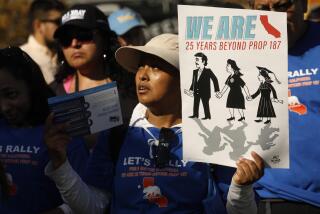Oscar Handlin dies at 95; Pulitzer-winning Harvard historian
- Share via
Oscar Handlin, a Pulitzer Prize-winning historian at Harvard University whose classic portrait of 19th century European emigrants launched the modern study of immigration as the predominant American story, died Sept. 20 in Cambridge, Mass. He was 95.
The cause was a heart attack, said his wife, Lilian.
Handlin, who taught at Harvard University for nearly 50 years, was a prolific scholar best known for “The Uprooted: the Epic Story of the Great Migrations that Made the American People.” Aimed at a popular audience, it won the 1952 Pulitzer Prize in history.
Its first two lines were an eloquent summary of his provocative thesis: “Once I thought to write a history of the immigrants in America. Then I discovered that the immigrants were American history.”
Those opening lines “are the two most famous sentences in all of the historiographic and social scientific study of immigration.... It’s just a grabber of a start,” said Rubén G. Rumbaut, a UC Irvine sociologist and expert on immigrant groups.
Written with empathy for the alienation and hardships endured by the 35 million Europeans and others who in the 1800s fled the Old World for a new one, Handlin’s powerful narrative about the United States as a nation of immigrants reshaped the field, which until then had been dominated by other themes.
“A dominant theme in American history when Oscar Handlin began studying it was the ‘frontier thesis’ — the notion that the American character was formed by a pioneer spirit and a westward drive to settle virgin land,” said Robert Darnton, the Carl H. Pforzheimer University professor of history at Harvard and a former student of Handlin’s.
“Handlin understood that American history began from the opposite direction, from the East, including the Far East, and that the experience of immigrants in the old country shaped their adaptation to life in the New World.”
Handlin was himself the son of Jewish immigrants from Russia, born in Brooklyn, N.Y., on Sept. 29, 1915. A precocious youth, he was reading historical tomes by the time he was 8, graduated from high school at 16 and earned a bachelor’s degree from Brooklyn College at 19.
In 1935, while teaching at Brooklyn College, he entered graduate studies at Harvard, where he felt the sting of anti-Semitism. A fellow student, John Hope Franklin, nominated him to be an officer of the Henry Adams Club, an organization of historians. Franklin, a black scholar who went on to rewrite African American history, recalled in his autobiography that club members reacted to Handlin’s nomination with “dead silence” that was broken only when “one of the members … said that although Oscar did not have some of the more objectionable Jewish traits, he was still a Jew.”
Handlin’s nomination was rejected, but in due course he distinguished himself.
At the suggestion of his mentor, historian Arthur M. Schlesinger Sr., he wrote his dissertation on Boston’s immigrants. Later published as a book, “Boston’s Immigrants: 1790-1880,” it won the Dunning Prize from the American Historical Assn. in 1941.
His second book, a study of government, was co-written with his first wife, historian Mary Flug Handlin, who became a frequent collaborator. She died in 1976.
In 1977 he married Lilian Bombach, with whom he also coauthored books, including the four-volume “Liberty in America: 1600 to the Present” (1986). Besides his wife, he is survived by three children from his first marriage, David, Joanna Smith and Ruth Manley; four grandchildren; a great-grandchild and a brother.
At Harvard, Handlin was not known as a dynamic lecturer. “He was the most boring lecturer I have ever heard. Everything he said was in a flat tone,” recalled New York University social critic Richard Sennett, one of many Handlin students who went on to distinguished academic careers, “but it was a very effective strategy because you had to listen very hard.”
Outside of class, Handlin was a lively person “who really liked debating, discussing and schmoozing with kids who didn’t share his views,” Sennett said. The historian was often at odds with students and colleagues during the 1960s, when he was a vocal supporter of the Vietnam War.
As younger historians entered the discipline, they discredited his thesis that immigration was a traumatic uprooting. “Handlin, many specialists now believe, overstated the alienation experienced by immigrants,” University of Minnesota immigration historian Donna Gabaccia said in an interview Tuesday. Still, she noted, he remains “the single most-cited historian in works of social science” for demonstrating the central importance of immigration in developing the American character.”
“Now the descendants of the immigrants are the story rather than the immigrants per se,” noted UC Irvine’s Rumbaut, who has surveyed more recent generations of ethnic Americans. But he was surprised when he re-read “The Uprooted” some years ago to find that many of the immigrant experiences Handler related are still echoed by newcomers more than a century later.
“Some of his quotes from immigrants were almost identical to quotes I had from Hmong refugees,” Rumbaut said. Regardless of the era, the immigrants feel helpless in their new land. “The adults,” he said, felt “like little birds in a nest waiting to be fed.”
More to Read
Start your day right
Sign up for Essential California for the L.A. Times biggest news, features and recommendations in your inbox six days a week.
You may occasionally receive promotional content from the Los Angeles Times.





















































